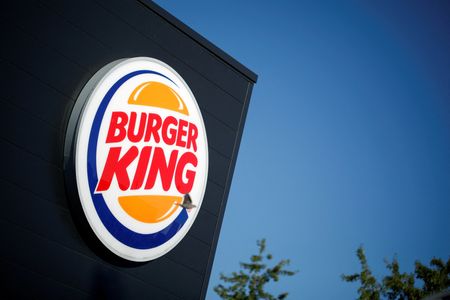By Hilary Russ
NEW YORK (Reuters) -Restaurant Brands International Inc on Tuesday named a new chief executive as it accelerates a turnaround plan for its struggling Burger King brand.
The company, which also owns Popeyes, Tim Hortons and Firehouse Subs, slightly missed Wall Street profit estimates for its fourth quarter ended Dec. 31, due in part to higher operating expenses. Shares fell more than 3.5%.
Company veteran and current Chief Operating Officer Joshua Kobza will take over as CEO on March 1, replacing Jose Cil who has been at the helm since 2019 and will remain with the company for a year as an advisor.
Under Cil, Burger King rebranded in 2021 for the first time in two decades, modernizing its logo, packaging, uniforms and store decor. Cil also brought in former Domino’s Pizza executive Tom Curits to run Burger King in the United States and Canada.
In September 2022, the chain announced a $400 million “Reclaim the Flame” turnaround plan to ramp up advertising, bring in new kitchen equipment and remodel restaurants.
And in November, Restaurant Brands brought in Patrick Doyle as executive chairman. Doyle led a major turnaround at Domino’s when he ran that chain until 2018.
Even so, in January, one of Burger King’s biggest U.S. franchisees with 90 restaurants filed for bankruptcy, saying inflation had bloated expenses while traffic fell, according to news reports.
“There are definitely some operators that have been struggling,” Kobza told Reuters in a phone interview. “If there have to be restructurings, we’re going to be intimately involved in those,” to help set the franchisees up for success, he said.
TOP-LINE GROWTH
So far this year, Restaurant Brands has brought Burger King’s general managers together, meeting with them in every U.S. region. Restaurant remodels will begin this year and ramp up in 2024, Kobza said.
Tuesday’s earnings results “demonstrate that the company’s initiatives to drive top-line growth across the brands appear to be making progress,” Citi analyst Jon Tower wrote. But the company will still be pressured by inflation and investments to drive sales, he wrote.
Like other fast food companies, Toronto, Canada-based Restaurant Brands has been grappling with elevated costs of transportation, labor and raw materials, and has had to raise prices of its menu items over the past year.
Total revenue rose about 9% to $1.69 billion in the fourth quarter, compared with estimates of $1.67 billion, according to IBES data from Refinitiv.
Excluding items, Restaurant Brands earned 72 cents per share, compared with expectations of 73 cents.
Global comparable sales rose nearly 8% in the quarter, led by 11% growth at Tim Hortons Canada and Burger King International – particularly in France, Spain, Australia, Brazil and Britain, helping offset stress in China.
(Reporting by Hilary Russ in New York and Deborah Sophia in Bengaluru; Editing by Sriraj Kalluvila and David Holmes)

